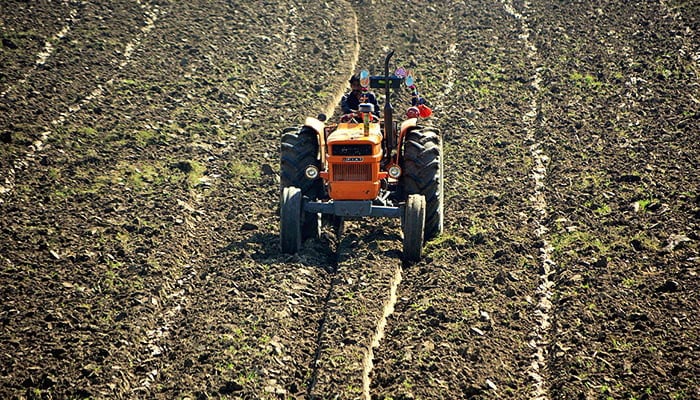Tractor industry faces critical test as affordability limits innovation
LAHORE: The struggling tractor industry is currently at a critical juncture, grappling with a complex and prolonged set of challenges that hinder a shift towards innovation over manufacturing relatively low-cost products.
The News spoke with Sakib Eltaff, chief executive officer of Al-Ghazi Tractors Limited, a leading tractor manufacturer in the country, to gain insights into the tractor industry's dynamics and its crucial contribution to agriculture.
Eltaff says that the agricultural sector has faced challenges with the onset of the current year. Typically, January and February have been strong months for sales. However, unfortunately, these months in 2025 have seen sales drop to an all-time low, approximately 50 per cent below the eight-year average and 43 per cent lower than last year’s level.
The Punjab government’s Green Tractor Scheme was well-received for providing relief to farmers. However, the expert adds, it is essential to learn from the implementation of the scheme and improve it further. The collaborative policy framework should focus on increasing mechanisation, not substituting existing market demand.
He mentions factors behind plummeting tractor sales. Last year, the Punjab government introduced a green tractor scheme, which has resulted in the delivery of various tractors this year. The demand generated last year is still being fulfilled, with tractors being delivered and invoiced in the current year. Consequently, if sales from January and February are excluded, the market shows a decline of 63 per cent. “This alarming statistic indicates a substantial impact, not only on us as tractor manufacturers but also on the broader ecosystem, including our vendors, dealers, customers, and financial stakeholders.”
With sales down by nearly two-thirds compared to the previous year’s average, the economic challenges have had a ripple effect on the entire ecosystem of the tractor industry, including vendors, dealers and bankers. The 230 vendors aid in the localisation of parts, providing employment to approximately 30,000 skilled labourers.
He says that “the government’s scheme should not replace the tractor’s retail programme that negatively impacts the whole supply chain. Rather, they should support the existing retail stream. So, if you want to increase mechanisation, you need to develop a strategy that will actually promote the regular retail chain and enhance overall mechanisation.”
Per the CEO of Al-Ghazi Tractors, taxes have added to the economic challenges faced by the industry. “We need a collaborative approach to understand the impact of taxes on the downstream customer and develop policies that support the industry. The government should focus on sustainable programmes that enhance mechanisation. The sales tax is currently 14 per cent. Historically, the tax regime has varied levies, and it is essential to find a balance that supports the industry and the end consumer. It is necessary to determine the ideal tax regime that does not hurt the end consumer’s purchasing power,” he adds.
Eltaff shares that farmers need support to afford tractors. “We need programmes that provide subsidised financing options, such as the prime minister’s scheme. Banks should also participate in providing financing options, but we need to develop programmes that accommodate loan plans while considering farmers’ erratic income streams and repayment patterns.”
What could be the way forward? The low horsepower per acre is a significant challenge, Eltaff adds. “We need to work collaboratively as an industry to address this issue. The government should develop policies that support mechanisation, and we should explore new technologies and implements to enhance productivity.”
The tractor industry needs a proper mechanisation policy that also goes beyond tractors and includes other equipment and technologies. “We should explore new technologies, such as drones and GPS-enabled tractors, to enhance productivity. For example, recently, we have worked with a company to develop an autonomous tractor. A third-party company provides solutions that make it driverless. These are new technologies that we can start to embrace and see how we can bring them into the market. We need to work collaboratively with the government and other stakeholders to develop policies that support innovation in the industry,” he concludes.
-
 Gracie Abrams Follows 'Kylie Jenner Playbook' With Paul Mescal Romance
Gracie Abrams Follows 'Kylie Jenner Playbook' With Paul Mescal Romance -
 Dua Lipa Shares 'Love Letter' With New Boyfriend After Emily Ratajkowski Confirms Romance With Her Previous Beau
Dua Lipa Shares 'Love Letter' With New Boyfriend After Emily Ratajkowski Confirms Romance With Her Previous Beau -
 Brazilian Beauty Influencer Passes Away After Suffering 'medical Emergency'
Brazilian Beauty Influencer Passes Away After Suffering 'medical Emergency' -
 Sarah Ferguson Turns Into A Bulldozer With Beatrice, Eugenie: ‘Help Me Out’
Sarah Ferguson Turns Into A Bulldozer With Beatrice, Eugenie: ‘Help Me Out’ -
 Australian Prime Minister's Letter Against Andrew Mountbatten-Windsor Made Public
Australian Prime Minister's Letter Against Andrew Mountbatten-Windsor Made Public -
 'Project Runway' Alum Tim Gunn Reveals Why He's Been Celibate For 43 Years
'Project Runway' Alum Tim Gunn Reveals Why He's Been Celibate For 43 Years -
 Delroy Lindo Breaks Silence On John Davidson's Racial Slur Shock At 2026 BAFTA: 'We Did What We Had To Do'
Delroy Lindo Breaks Silence On John Davidson's Racial Slur Shock At 2026 BAFTA: 'We Did What We Had To Do' -
 King Charles Prepares Next Move As Andrew Shows No Remorse
King Charles Prepares Next Move As Andrew Shows No Remorse -
 Epstein's Brother Invited To Discuss Royal Family's Future After Andrew's Arrest, On Popular Show
Epstein's Brother Invited To Discuss Royal Family's Future After Andrew's Arrest, On Popular Show -
 BAFTA Winner Robert Aramayo Defends Director's Racial Slurs Amid Tics
BAFTA Winner Robert Aramayo Defends Director's Racial Slurs Amid Tics -
 Prince William, Kate Middleton’s Troubles Take On A New Face: ‘They’re Steeling Themselves’
Prince William, Kate Middleton’s Troubles Take On A New Face: ‘They’re Steeling Themselves’ -
 'Coronation Street' Star Sally Ann Matthews Finally Reveals Why She Quit ITV Soap
'Coronation Street' Star Sally Ann Matthews Finally Reveals Why She Quit ITV Soap -
 Prince Andrew's Major Sacrifice For Princess Beatrice, Eugenie Royal Titles Revealed
Prince Andrew's Major Sacrifice For Princess Beatrice, Eugenie Royal Titles Revealed -
 ICE Agent Misfired Bullet Into Minnesota Hotel’s Guest Room
ICE Agent Misfired Bullet Into Minnesota Hotel’s Guest Room -
 Andrew Mountbatten-Windsor, Fergie Still Counting On Each Other? Deets
Andrew Mountbatten-Windsor, Fergie Still Counting On Each Other? Deets -
 Piers Morgan Reacts To Photo With Ghislaine Maxwell
Piers Morgan Reacts To Photo With Ghislaine Maxwell




